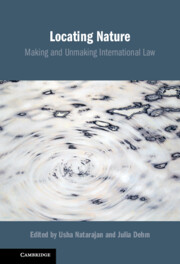Book contents
- Locating Nature
- Locating Nature
- Copyright page
- Contents
- Contributors
- Foreword
- Acknowledgements
- Introduction: Where Is the Environment?
- Part I Locating Nature in International Law
- Part II Unmaking International Law
- 4 Appropriating Nature
- 5 Reflections on a Political Ecology of Sovereignty
- 6 The Maps of International Law
- 7 Denaturalising the Concept of Territory in International Law
- 8 Who Do We Think We Are?
- 9 Law, Labour and Landscape in a Just Transition
- Part III Alternatives and Remakings
- Index
8 - Who Do We Think We Are?
Human Rights in a Time of Ecological Change
from Part II - Unmaking International Law
Published online by Cambridge University Press: 22 September 2022
- Locating Nature
- Locating Nature
- Copyright page
- Contents
- Contributors
- Foreword
- Acknowledgements
- Introduction: Where Is the Environment?
- Part I Locating Nature in International Law
- Part II Unmaking International Law
- 4 Appropriating Nature
- 5 Reflections on a Political Ecology of Sovereignty
- 6 The Maps of International Law
- 7 Denaturalising the Concept of Territory in International Law
- 8 Who Do We Think We Are?
- 9 Law, Labour and Landscape in a Just Transition
- Part III Alternatives and Remakings
- Index
Summary
This chapter explores the relationship between human rights and the environment. It begins by asking ‘who we think we are’ to understand the forms of subjecthood and subjectivity produced by human rights. It argues that human rights normalize a series of false conceptions about our collective self that have detrimental social and ecological consequences. The chapter next examines the question of ‘where we think we are’, probing the ontological rift between humans as subjects of rights and ‘the environment’ as the repository of resources with which to satisfy human entitlements. The chapter challenges human rights as a hubristic organizing category and observes that the ‘who’ and ‘where’ questions, artificially separated in the chapter, serve to show that the way humans treat each other is inextricable from the way we treat nature. To undo relationships of mastery, ownership, and violence between the subjects and objects of human rights law, projects for human wellbeing and environmental struggles need to engage with and understand each other outside the unproductive rubric of rights discourse.
Keywords
- Type
- Chapter
- Information
- Locating NatureMaking and Unmaking International Law, pp. 200 - 228Publisher: Cambridge University PressPrint publication year: 2022
- 1
- Cited by



